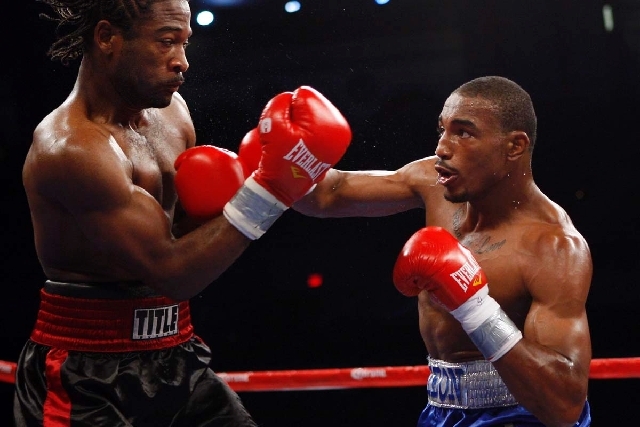Win, lose or draw, athletic commission needs to change

As he sat recently in a cramped meeting room inside the Sawyer Building and freely accepted a metaphorical beating, it wasn’t clear whether middleweight prospect J’Leon Love fully appreciated his role in the changing world of the Nevada Athletic Commission.
He just wanted to finish his confession for ingesting a weight-cutting diuretic prior to his last bout. With help from his lawyer and his mother, Love wanted to make his act of contrition, cut his losses, and get on with his fledgling professional career.
But Love’s story illustrates the burgeoning challenge facing the NAC these days. The political patronage-larded state commission charged with regulating boxing and mixed martial arts here is facing something of a forced evolution when it comes to its drug policies.
Although I believe the commission’s trouble has been smoldering for some time thanks to its failure to read the tea leaves of national change on marijuana, the issue came to a head this past year when it fined boxer Julio Cesar Chavez Jr. $900,000 for testing positive for pot use prior to his Sept. 15 loss in Las Vegas to Sergio Martinez. The fine was 30 percent of his purse, and attorneys Donald Campbell and Colby Williams vowed to appeal, for starters, on the grounds that such a fine violated the U.S. Constitution.
The NAC and the private attorneys negotiated a settlement that saved the state commission a lot of pain and embarrassment. Chavez already had served his nine-month suspension. On the day Love found himself on the undercard of the commission meeting, the Chavez fine was reduced to $100,000.
But the greater issues facing the NAC aren’t going away. Chairman Bill Brady appears to appreciate that fact, and the commission is in the middle of re-examining its drug policies at a time the World Anti-Doping Agency (WADA) has dramatically changed its view of the dangers of trace elements of marijuana in an athlete’s bloodstream.
It’s all good for Chavez, but what about the Loves of the fight game?
Although extensive use of diuretics can mask other drugs and can be dangerous, they are commonly used to help boxers cut a few pounds to make the pre-fight weigh-in. They are on the commission’s banned list.
Love swore that he didn’t realize they were a no-no, and the boxer appeared convincing . Love admitted he fell behind in his training because of a family crisis and had to cut more than 10 pounds before his fight. With a day to go, he was still over 160 pounds and took to the treadmill. He also took a diuretic, which removes water from the body.
The young fighter wasn’t given a warning or instructed to attend a mandatory drug awareness class, which would have been a refreshing sign of personal growth on the commission’s part. It could have fined him a few hundred dollars and put him on notice. And it might have suspended him for a short time as a reminder not to be so careless about what he put into his body.
But it didn’t do that.
It lectured him at some length about the trouble he was in. Brady played the role of father figure with a belt and alternated life lessons with a rhetorical tail whipping. It was painful to watch, but Love took it in stride.
Then, just when it seemed the NAC would let Love off with that warning, they meted out a $10,000 fine for an undercard fighter with a six-month suspension that will ensure he’ll miss a fall payday. His split-decision victory was declared no contest. The unanimous vote conservatively cost Love about $50,000.
The commissioners made it clear it was nothing personal. Hey, they liked the kid and wished him well. Brady even hugged Love’s mom.
That might be justice in some circles, but to me it looked more like a mugging.
From this corner, the commission still has changes to make in its drug policy.
John L. Smith’s column appears Sunday, Tuesday, Wednesday and Friday. E-mail him at jsmith@reviewjournal.com or call (702) 383-0295.